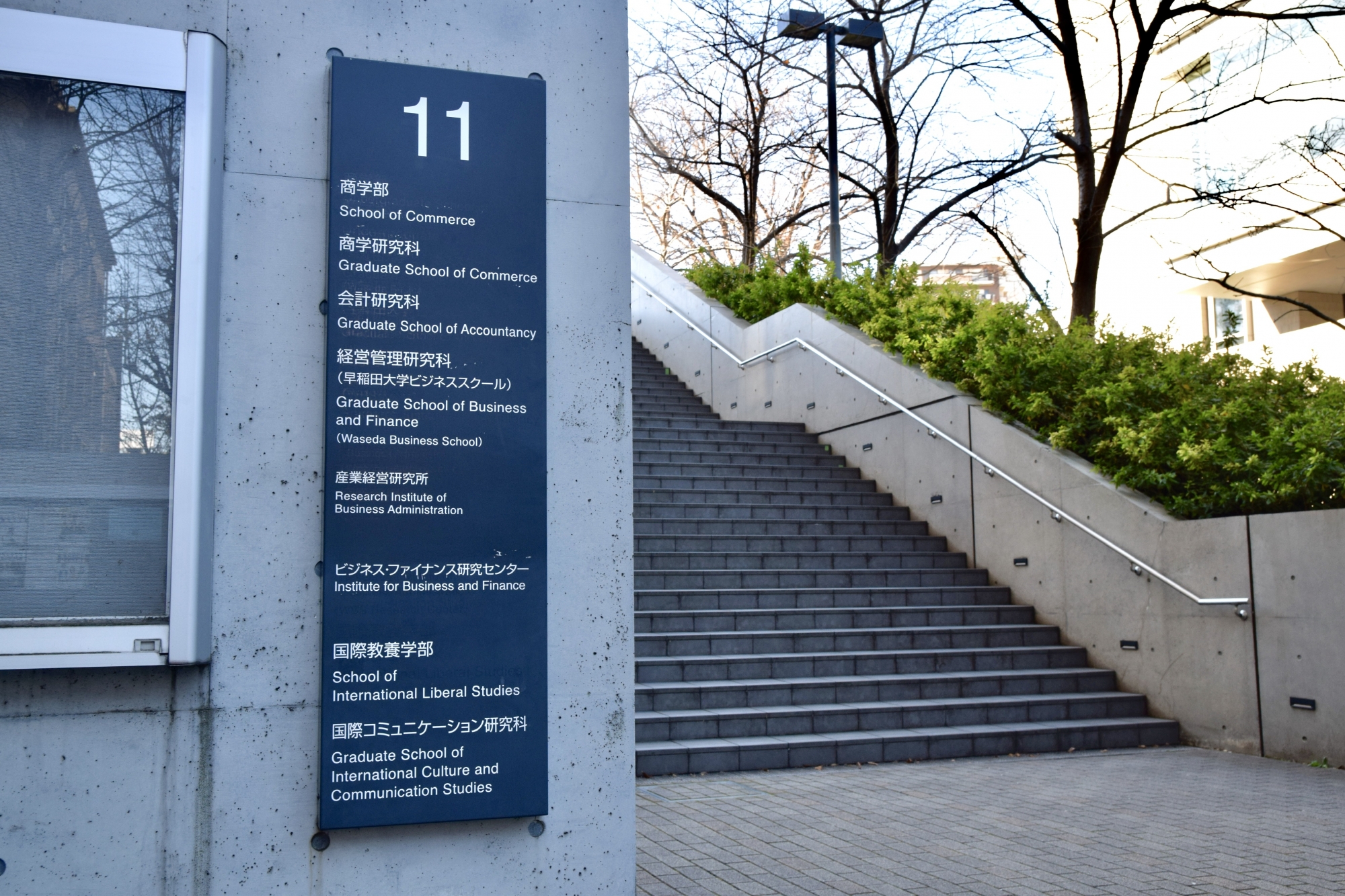Tackling PhD studies during a pandemic—an international student’s perspective
Thu, Dec 23, 2021-
Tags
Academic and Urban Transits
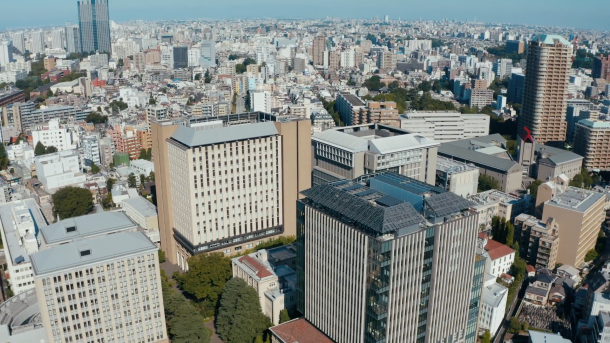
Buildings and facilities on Waseda Campus (forefront) surrounded by the Tokyo cityscape
The entirety of my PhD experience has coincided with the global coronavirus pandemic. In spite of this sobering statement, I find myself awash in gratitude for the people who have supported my journey and the communities I’ve joined in Tokyo, both on- and offline. I was fortunate enough to relocate to Japan in November 2020, during a narrow window of time in which new entries under a student visa were permitted. Now, nearing the end of my third semester of doctoral studies, I’m forging ahead into the second half of my program and further acquainting myself with the city around me.
In spring 2019—a whole lifetime ago, it feels like—I made first contact with my research director at Waseda, Professor Greg Dvorak. I was living in Brooklyn, New York and starting to seriously consider applying to PhD programs in Tokyo. More than a decade prior, I’d moved to New York to pursue a master’s degree at Columbia University; now I was considering whether I could give the scholarly life another chance while relocating closer to friends and family in Asia.
I came across Professor Dvorak, a scholar of cultural politics and gender studies, after researching Waseda’s breadth of English-language programs. Though his area of scholarship differs significantly from my own academic interests, I resonated with his broader inquiries into art and popular culture, as well as gender and sexuality. Professor Dvorak sent a warm and encouraging email in response to my self-introduction and tentative proposal of the doctoral project I envisioned under his tutelage. Heartened by this exchange, I began to gather my thoughts, and no small amount of documents and transcripts, to apply to Waseda’s Graduate School of International Culture and Communication Studies (GSICCS).
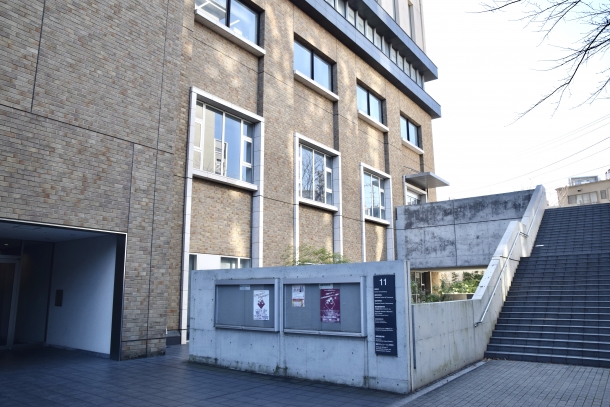
Building 11, home to both GSICCS and Waseda’s School of International Liberal Studies (SILS)
Founded in 2013, GSICCS is the graduate-level counterpart to the School of International Liberal Studies (SILS) and shares many of the same core faculty. The doctoral program currently offers three concentrations, by which students examine contemporary society through the lenses of linguistics, cultural studies, and international relations.
Under the rubric of cultural studies, I am exploring transpacific narratives of urban East Asia in film and literature, and their influence on the Asian diaspora, in particular. Think Parasite, Haruki Murakami, or Wong Kar-wai, for example—I’m digging into the context behind certain writers and filmmakers and examining how their cultural touchstones have collectively constructed a global imaginary of the East Asian city.
The PhD program itself has few curricular requirements and necessitates a fair amount of comfort with self-motivated research and writing. That is not to say it lacks structure; beyond coursework, there is most certainly a prescribed framework that guides students through the program with semester-to-semester deadlines and milestones. But I would describe the experience as fairly independent overall, and an exercise in discipline. In New York, I’d had a full-time career as a university administrator for many years, and this experience taught me how to efficiently organize and compartmentalize project-based work. Doctoral-level research is not unlike managing a major client or partnership—just with fewer meetings to schedule.
Since formally beginning my PhD in September 2020, I have been part of Professor Dvorak’s zemi (an abbreviated, phonetic transliteration of “seminar”), where his master’s and doctoral students come together weekly to share research updates, discuss methodologies, and engage in constructive dialogue in an atmosphere of mutual support. “Waseda sits at the intersection of a vast cultural landscape and neighborhoods of diverse populations from all over the world,” notes Professor Dvorak. “Both the School of International Liberal Studies and Graduate School of Culture and Communication Studies are spaces in which we build upon that diversity and complexity and invite creative, critical, constructive, open-minded discussion and thought from multiple perspectives.”
Indeed my classmates hail from Japan, Australia, Finland, Indonesia, Ukraine, China, and Vietnam, among other places. Research topics range from constructions of gender identities in China, Japan, or Thailand; East Asian idol culture and fandoms; perceptions of mixed race or foreign athletes in the Japanese sports industry; cultural values embedded in advertising and other media; and many more fascinating areas. My own academic background lies in storytelling: film studies and production, creative writing, Chinese and French literature. Many of my peers’ projects are completely uncharted territory for me, in other words. But I’ve greatly enjoyed learning about their work and research process, sharing resources and reading lists, and even tackling some challenging texts together.
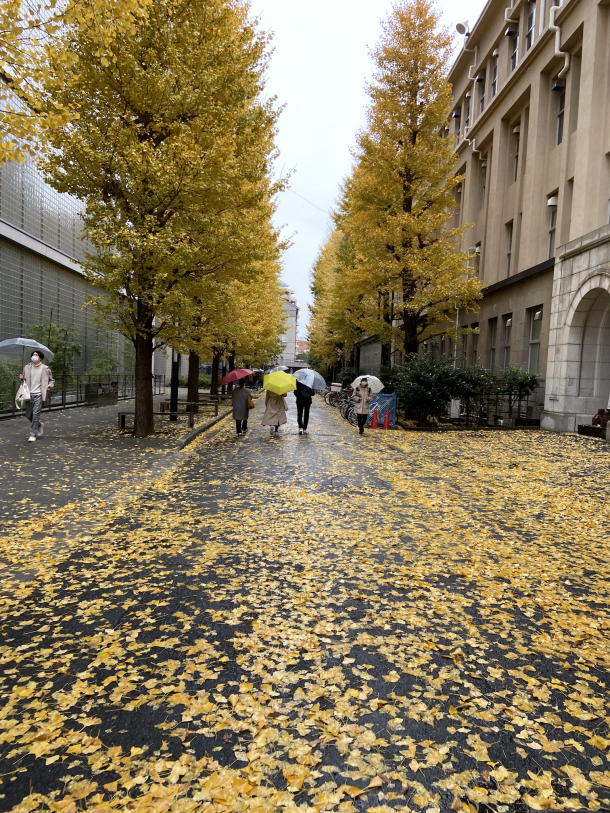
Golden ginkgo leaves underfoot on a rainy autumn day
In addition to my required coursework at GSICCS, I have devoted a fair amount of time to improving my Japanese skills through the classes offered by Waseda’s Center for Japanese Language (CJL). That most all of my curricular experience thus far has been conducted via Zoom has not fazed me, though I may be in the minority. Clearly, the conditions for casual interaction with one’s peers and teachers are less than ideal through an online platform. But humans are adaptable creatures. We seek what we crave in connections, in camaraderie. In this current semester of fall 2021, a few of my classes have been held in hybrid format, with some students in a physical classroom, others on Zoom. Despite the challenges of this pandemic era, I’ve been able to get to know my classmates through online interactions, as well as picnics and museum trips, dinners and small outings, all while keeping careful tabs on COVID preventative measures and evolving policies during Japan’s long state of emergency this past year.
I balance my studies with freelance work as an editor and Chinese-English literary translator, taking on projects remotely and completing them at my own pace. This autonomy is indeed a luxury in some respects—until that moment you realize you spend almost all of your waking hours not only looking at the laptop, but swimming in a sea of words. I’ve also had the privilege of teaching undergraduates at Temple University’s Japan Campus, over in Sangenjaya. To articulate one’s passions in the classroom, to shepherd a curricular experience unfolding over many weeks, these are among the challenges and joys of academic life.
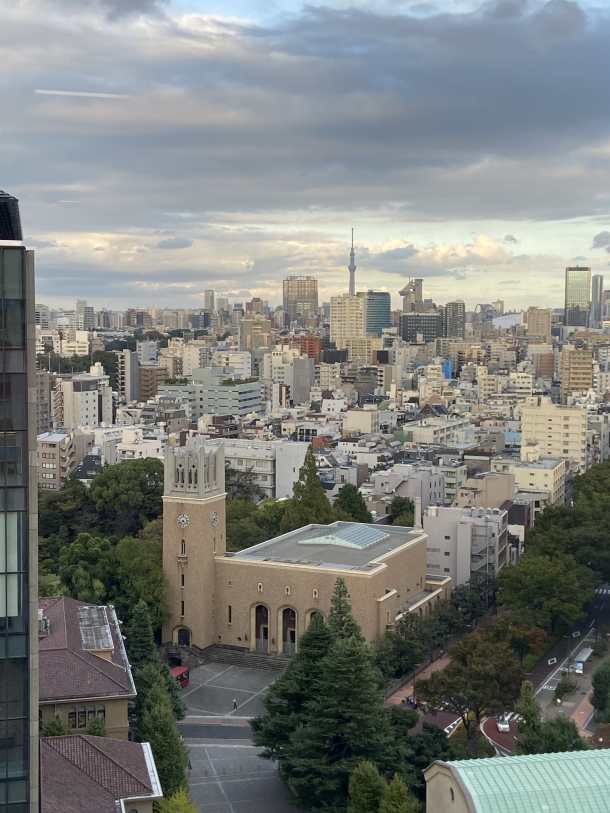
Waseda’s iconic Okuma Auditorium, foregrounded against the urban sprawl of Tokyo
My doctoral project continues to take shape through ongoing conversations with Professor Dvorak and, more recently, Professor Takashi Aso, who is providing guidance to me in an independent study this term. Professor Aso’s depth of knowledge about postmodern literature and Vietnamese diasporic communities has helped me further refine my own thinking about the politics of global migrations. I’m writing a draft of my dissertation, page by page, while making use of Waseda’s libraries either in-person or virtually. To immerse myself in urban narratives, I have been reading widely and watching plenty of movies and TV shows. And I have been getting out into the vibrant metropolis that is Tokyo, thrumming with energy, layered with histories, at once dazzling and quaint.
I’ve had my share of challenges transitioning to PhD life during a pandemic, especially in managing a transcontinental move. In other respects, however, the intense introspection afforded by this extraordinary era has been perfectly suited to beginning anew and reflecting on all that has led me here. Going into the third year of the pandemic, we continue to live in a state of physical and emotional constraint. But the mind can offer escape, through memory or meditation, in the stories we tell to ourselves and each other. We make our own meaning and map our place in the world through these overlapping narratives. The next chapter will be here soon enough—until then we can only take it one day at a time, one page at a time.
*This article was written and contributed by the following student.
Student Contributor
Mike Fu
Graduate School of International Culture and Communication Studies


